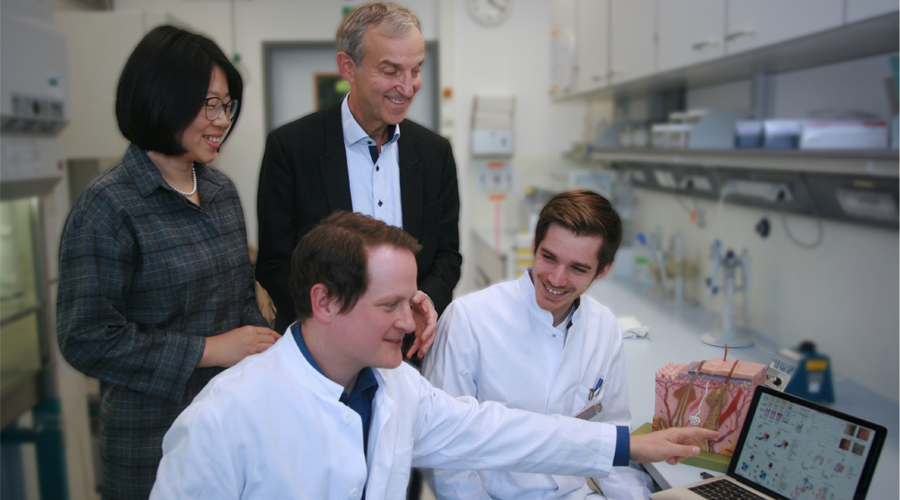Neurodermatitis and psoriasis – RESIST team explores location and type of immune cell activity:
Many people suffer from neurodermatitis (atopic dermatitis) or psoriasis. These chronic inflammatory diseases, which have so far been incurable, can lead to a significant loss of quality of life due to the agonising itching and stigmatisation in severe forms.
Researchers of RESIST have now gained a number of new insights with potential clinical relevance using state-of-the-art technologies such as T-cell receptor and single-cell RNA sequencing based on skin biopsies and blood samples from patients. They have published these in the journal Allergy, currently the leading publication in the field of allergology, in two articles. The main authors include Dr. Bowen Zhang from the research group of Professor Dr. Yang Li, Centre for Individualised Infection Medicine and TWINCORE, and Dr. Lennart Rösner and Dr. Stephan Traidl from the team of Professor Dr. Thomas Werfel, MHH Clinic for Dermatology, Allergology and Venereology.
It was already known that in both psoriasis and neurodermatitis, T-cells of the immune system migrate from the blood into the skin and drive the inflammation there. Detailed examination of T-cells in blood and skin now led to evidence that in atopic dermatitis they migrate mainly into the skin, whereas in psoriasis they both drive inflammation in the skin and move from the blood into other tissues. Further findings suggested that the inflammatory factors produced by the T-cells in atopic dermatitis act primarily on skin cells, whereas in psoriasis they also activate circulating immune cells in the blood, potentially triggering or increasing inflammation elsewhere in the body. “This underlines that in psoriasis, possible disease symptoms must also be investigated beyond the skin. If necessary, the joints or the cardiovascular system may then also need to be treated, for example,” says Dr. Stephan Traidl.
The team also found out that macrophages (phagocytes), which are also found in the skin in both diseases, develop differently and differ in terms of their inflammatory mediators. “This is very interesting with regard to neurodermatitis. Because here, skin infections with pathogens such as staphylococci and herpes viruses can occur, which are directly fought by the macrophages,” says Dr. Lennart Rösner.
Neurodermatitis and psoriasis
Atopic dermatitis progresses in episodes and is manifested by pronounced itchy eczema. In Germany, more than ten percent of children of preschool age are affected, but also about two percent of all adults. The disease begins with a defect in the skin barrier in interaction with changes in the immune system. The triggers for a worsening are manifold – allergens, skin-irritating substances, mechanical stimuli, infections and psychological stress are among them.
Psoriasis is characterised by skin plaques on the stretched side. In Germany, about two to four percent of all adults are affected, mainly in the second and third decades of life.
Both diseases are treated externally and internally, depending on their severity. In recent years, there have been a number of effective new developments in this field. In the MHH Clinic for Dermatology, Allergology and Venereology, corresponding special hours are offered.
The photo shows Dr. Rösner (front) with Prof. Li, Prof. Werfel and Dr. Traidl (from left) in the dermatology laboratory. Copyright: Imke Arning

